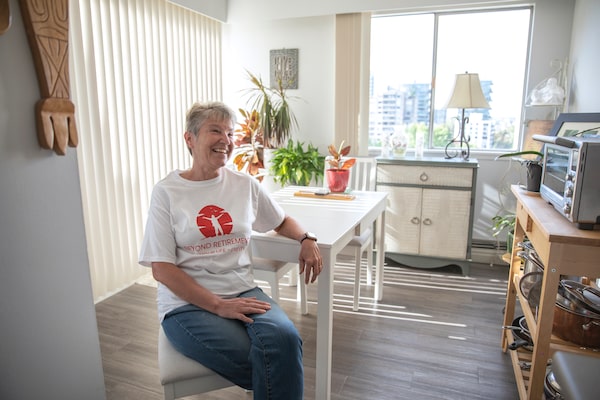
Podcaster, house-sitter and retirement coach Jacquie Doucette, photographed in Vancouver, has pursued several different lines of business since retiring from the public service.Maggie Naylor
Jacquie Doucette was looking for a way to travel affordably following her official retirement from the Canadian public service. So, the Ottawa area resident joined an international network of house- and pet-sitters where women outnumber men by a considerable margin.
While these positions don’t pay directly, they can be financially beneficial who people who prefer seeing the world to having a home base, Ms. Doucette says.
“I have friends who’ve been doing it since 2012 who’ve kept track of their expenses, and they’re paying easily 70 per cent less in costs through the year than someone living at home, because you don’t have a mortgage or insurance or any of that sort of thing,” she says. “[Plus], you get a chance to see all these countries as a local.”
Prior to taking early retirement, Ms. Doucette explored a number of possible income-generating avenues, including multi-level marketing, without finding a good fit. She ended up launching a podcast called Beyond Retirement.
“I started the podcast because I couldn’t find the [information] I was looking for about what to do after retirement, and I figured if I was looking, other people probably were too,” she says.
In the process, Ms. Doucette says she “ran into a lot of people who said, ‘I can’t retire – my job is my life.’” This inspired her to start yet another venture – a coaching business to help people who are not sure they can retire because “they’re scared they won’t have anything to do.”
Since launching the podcast and coaching business, Ms. Doucette says she’s talked to many retirement-aged people who have taken on a new line of business. “Almost all of them seem to be trying to build a little business of their own around some project they are passionate about, or something they stumbled across,” she says.
Topping up income post-retirement
Like Ms. Doucette, some Canadian women are finding creative ways to generate income past traditional retirement age, often fulfilling personal passions in the process.
That’s one of the themes author Ann Douglas uncovered while interviewing 100+ women for her new book, Navigating the Messy Middle: An Honest and Wildly Encouraging Guide for Mid-Life Women.
The financial motivation to continue working postretirement is obvious, she says.
“Women live longer, and we typically have had lower lifetime earnings because of interruptions for care work,” Ms. Douglas says. In her research, Ms. Douglas also spoke with women who had experienced financial setbacks, such as divorce and bankruptcy, that derailed plans to retire.
Ann Decter, senior director of community initiatives at the Canadian Women’s Foundation, says that “women have about 30 per cent less, wealth-wise,” when they approach retirement age. And that gender gap is even greater for Indigenous, racialized and immigrant women.
What’s more, even those who are fortunate enough to have a pension are more likely to have gaps in contributions that are reflected in the final numbers when women hit 65, says Katherine Scott, a senior economist at the Canadian Centre for Policy Alternatives.
“Women’s wage growth has lagged men’s; both are lagging inflation,” says Ms. Scott. “I would imagine there are lots of older folks out there looking to pursue earned income in whatever way makes sense. Taking consulting work, opening a small business – those are the stories we’re going to start seeing.”
With the pandemic having proven the viability of remote work, companies may be increasingly open to hiring contract or freelance talent too.
Greater flexibility and autonomy
Ms. Douglas says that some of the women she spoke with for her book said they turned to self-employment or contract work postretirement to gain more flexibility and autonomy.
“Sometimes people have a health condition that doesn’t allow them to work as many hours, or they have family responsibilities,” she says. “One woman, who was devastated when she was unexpectedly downsized, decided that rather than put her fate in the hands of a company, she would do part-time consulting to have a bit more control.”
Self-employment can also protect against job loss due to ageism and sexism, Ms. Douglas adds.
For other women, the driving factor is a yearning to apply their skills to more personally meaningful projects. That’s something Nadine Araksi of Kickstartology Coaching in Toronto has repeatedly encountered while coaching women through life transitions.
“We see a lot of people who are approaching retirement and who are looking to take their knowledge and share it with others, [to] help coach the next up-and-comers in their field,” she says.
Anna Harvey, a Victoria, B.C., retirement coach, spent many years helping people transition to life post-career, but she isn’t planning to join her former clients any time soon. She says she will be launching a new venture early next year.
“I’m reinventing [my business] yet again, and I’m 69,” she says.
While she’s not ready to talk about her new business just yet, Ms. Harvey says that part of what keeps her working is the satisfaction of giving back.
Ms. Araksi says that many of her clients in their 50s and 60s express a desire to pursue a long-postponed dream career or return to an abandoned hobby. Others need help discovering what that inner passion might be.
“They’ve been so used to giving [to] everyone else in their life, and now they have a bit of space where they can say, ‘Well, what do I want to do?’” she says. “A big part of what we do is connecting women with their desire which they’ve suppressed for so long.”

Interested in more perspectives about women in the workplace? Find all stories on the hub here, and subscribe to the new Women and Work newsletter here. Have feedback on the series? Email us at GWC@globeandmail.com.